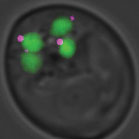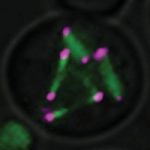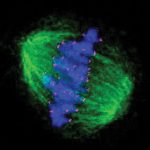We study the mechanisms of meiotic and mitotic cell cycle regulation leading up to chromosome segregation and gamete formation. Errors in meiosis can have devastating consequences, causing miscarriage, infertility and trisomy conditions. Errors in mitotic cell cycle regulation can result in cancer. We seek to understand how errors in meiosis and mitosis occur by studying how cells progress through a series of ordered events, how chromosomes attach to spindle microtubules, and how attachments are monitored by the spindle checkpoint. We use both budding yeast and mouse oocytes for our studies.



Ongoing Projects
- How are the meiotic and mitotic cell cycles regulated? Many of the same cell cycle regulators function in both mitosis and meiosis but they often take on additional or more important roles in meiosis. We perform comparative studies between mitosis and meiosis to understand how these functions differ.
- How is meiosis limited to two and only two divisions? We found that in the absence of autophagy, budding yeast cells undergo additional rounds of chromosome segregation. We are studying how meiotic exit is regulated and the importance of autophagy in this process.
- How do chromosomes properly attach to spindle microtubules for faithful segregation in meiosis and mitosis? We are interested in how kinetochore-microtubule attachments are made, how misattachments are corrected, and how the spindle checkpoint is signaled.